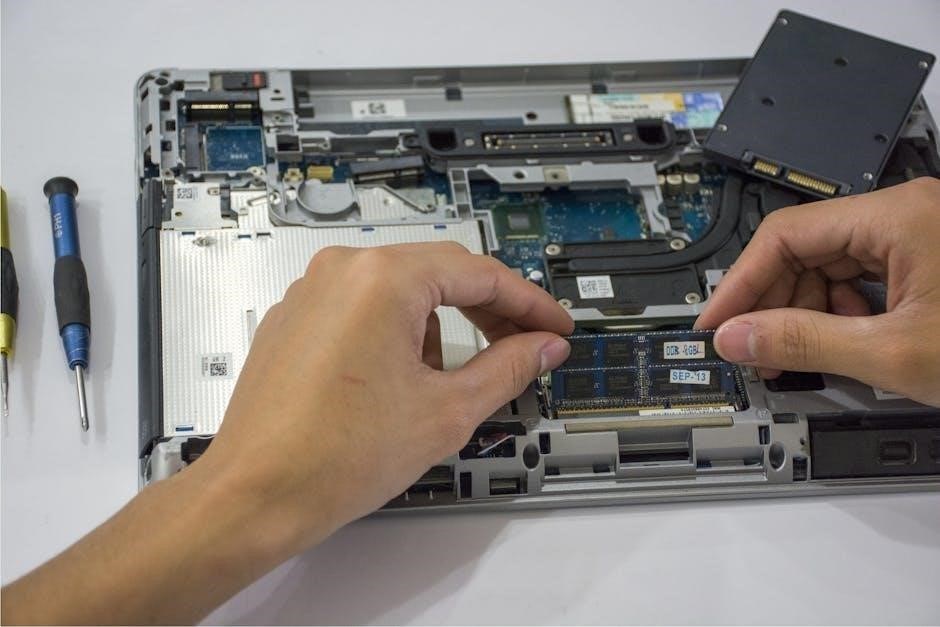The 2018 Ram 1500 maintenance schedule is a comprehensive guide designed to ensure optimal vehicle performance and longevity․ It outlines recommended services, including oil changes, tire rotations, and fluid checks, to prevent potential issues․ Regular maintenance helps maintain efficiency, safety, and overall reliability․ Refer to the 2018 Ram 1500 User Guide for detailed instructions and intervals․
1․1 Importance of Regular Maintenance
Regular maintenance is crucial for ensuring the longevity, performance, and safety of your 2018 Ram 1500․ By following the recommended maintenance schedule, you can prevent mechanical failures, reduce repair costs, and maintain optimal fuel efficiency․ Neglecting routine services can lead to premature wear on critical components, such as the engine, transmission, and brakes, which may result in costly repairs․ Oil changes, tire rotations, and fluid checks are essential for keeping your truck running smoothly․ Regular inspections also help identify potential issues early, ensuring your vehicle remains reliable for years to come․ Additionally, maintaining your Ram 1500 according to the schedule can enhance its resale value and ensure it continues to deliver the power and capability you expect․ Consistency in maintenance is key to protecting your investment and staying safe on the road․
1․2 Overview of the 2018 Ram 1500
The 2018 Ram 1500 is a powerful and versatile pickup truck designed for both work and leisure․ Known for its robust performance, it features a range of engine options, including the 3․6L V6 Pentastar and the 5․7L HEMI V8, delivering impressive horsepower and torque․ The truck boasts a durable design, with a focus on comfort and technology, making it a top choice for drivers seeking reliability and capability․ Its interior is equipped with premium materials, while advanced features like the Uconnect infotainment system enhance the driving experience․ The 2018 Ram 1500 also offers superior towing and hauling capabilities, making it ideal for heavy-duty tasks․ With multiple trim levels and configurations, it caters to a wide range of needs, from everyday commuting to off-road adventures․ The truck’s combination of strength, style, and innovation solidifies its reputation as a leader in its class․ Whether for personal use or professional demands, the 2018 Ram 1500 is engineered to deliver exceptional performance and durability․

Understanding the Maintenance Schedule
The 2018 Ram 1500 maintenance schedule outlines essential services at specific intervals to ensure optimal performance․ Oil changes are recommended every 7,500 to 10,000 miles, while tire rotations and fluid checks are suggested at 30,000 miles․ Regular inspections help prevent issues and extend vehicle life․
2․1 Key Components of the Schedule
The 2018 Ram 1500 maintenance schedule is structured to ensure all critical systems are inspected and serviced at appropriate intervals․ Oil changes are a cornerstone, typically required every 7,500 to 10,000 miles, depending on driving conditions․ Tire rotations are recommended every 30,000 miles to ensure even tread wear and optimal traction․ Fluid checks, including engine oil, coolant, and brake fluid, are essential for maintaining proper vehicle function․ The schedule also includes air filter inspections every 15,000 miles and replacements as needed․ Brake system inspections are advised every 30,000 miles to monitor pad wear and fluid levels․ Additionally, spark plug replacements are scheduled at 100,000 miles to maintain engine performance․ Regular battery checks ensure reliable starting power, while belts and hoses are inspected for signs of wear․ Adhering to these components ensures the Ram 1500 runs efficiently and reliably over time․
2․2 Recommended Maintenance Intervals
The 2018 Ram 1500 maintenance schedule outlines specific intervals for various services to ensure the vehicle operates at peak performance․ Oil changes are typically required every 7,500 to 10,000 miles, depending on driving conditions․ Tire rotations are recommended every 30,000 miles to ensure even tread wear and optimal traction․ Fluid checks, including engine oil, coolant, and brake fluid, are essential for maintaining proper vehicle function․ The schedule also includes air filter inspections every 15,000 miles and replacements as needed․ Brake system inspections are advised every 30,000 miles to monitor pad wear and fluid levels․ Additionally, spark plug replacements are scheduled at 100,000 miles to maintain engine performance․ Regular battery checks ensure reliable starting power, while belts and hoses are inspected for signs of wear․ Adhering to these components ensures the Ram 1500 runs efficiently and reliably over time․
Oil Change and Fluid Check
Regular oil changes and fluid checks are vital for the 2018 Ram 1500’s performance․ Oil changes are recommended every 7,500 to 10,000 miles, while fluids like coolant, brake, and transmission should be inspected and topped off as needed to prevent damage․
3․1 Oil Change Intervals
Regular oil changes are essential for maintaining the health and performance of your 2018 Ram 1500․ The recommended oil change interval is every 7,500 to 10,000 miles, depending on driving conditions․ Synthetic oil is preferred for its superior lubrication and durability․ Neglecting oil changes can lead to reduced fuel efficiency, engine wear, and potential damage․ Always use the oil grade specified in your owner’s manual to ensure compatibility․ Additionally, the engine filter should be replaced every 30,000 miles to maintain proper airflow and performance․ Sticking to the recommended schedule helps prevent costly repairs and ensures your truck runs smoothly․ For precise details, refer to the 2018 Ram 1500 maintenance schedule PDF or consult a certified technician․
3․2 Fluid Levels and Condition
Regular checks of fluid levels and condition are crucial for the 2018 Ram 1500’s performance and longevity․ Engine oil, coolant, transmission, and brake fluids should be inspected at every oil change or as specified in the maintenance schedule․ Ensure all fluids are at the recommended levels and free from contamination․ The transfer case fluid is typically replaced every 30,000 miles, along with the front and rear differential fluids, to maintain proper lubrication and prevent wear․ Always use fluids that meet the specifications outlined in the 2018 Ram 1500 owner’s manual to avoid compatibility issues․ Inspect for signs of leaks or discoloration, as these can indicate potential problems․ Proper fluid maintenance ensures smooth operation, prevents overheating, and safeguards critical components․ Refer to the 2018 Ram 1500 maintenance schedule PDF for detailed guidelines on fluid checks and replacements․
Tire Maintenance
Proper tire maintenance is essential for the 2018 Ram 1500’s performance and safety․ Regular tire rotations and pressure checks ensure even tread wear and optimal traction․ Inspect tires for damage and wear, and maintain the recommended pressure levels as outlined in the 2018 Ram 1500 maintenance schedule PDF․
4․1 Tire Rotation Pattern
Regular tire rotation is crucial for extending the life of your 2018 Ram 1500’s tires․ The recommended tire rotation pattern involves moving the front tires to the rear and the rear tires to the front, but in a specific cross pattern․ This ensures even tread wear and improves handling․ According to the 2018 Ram 1500 maintenance schedule PDF, tires should be rotated every 8,000 to 10,000 miles or at the first sign of uneven wear․ For most Ram 1500 models, the rearward cross pattern is suggested, where the front left tire moves to the rear right, and the front right tire moves to the rear left․ This method balances wear across all four tires and maintains proper traction․ Always refer to the owner’s manual for specific recommendations, especially for 4WD models, as the pattern may vary․ Proper rotation prevents uneven wear, which can lead to reduced fuel efficiency and safety risks․ By following the schedule, you ensure your tires perform optimally and last longer․ Check the 2018 Ram 1500 maintenance schedule PDF for detailed diagrams and guidelines․
4․2 Tire Pressure Checks
Regular tire pressure checks are essential for the performance and safety of your 2018 Ram 1500․ According to the 2018 Ram 1500 maintenance schedule PDF, tire pressure should be checked monthly and before long trips․ Proper inflation ensures better fuel efficiency, handling, and tire longevity․ The recommended tire pressure for most Ram 1500 models is 35 PSI for standard tires and 45 PSI for high-performance tires when cold․ Use a reliable tire pressure gauge to ensure accuracy․ Under-inflation can lead to reduced traction, uneven wear, and increased risk of a blowout․ Always refer to the tire information placard on the driver’s side doorjamb or the owner’s manual for specific pressure recommendations, as they may vary depending on the tire type and load rating․ Maintaining correct tire pressure is a simple yet critical step in preserving your vehicle’s overall health and safety․ Check the 2018 Ram 1500 maintenance schedule PDF for detailed guidelines and recommendations․
Brake System Maintenance
Regular brake system maintenance is crucial for safety and performance․ Inspect brake pads, rotors, and fluid levels periodically․ Neglecting maintenance can lead to reduced stopping power and increased repair costs․ Always follow the 2018 Ram 1500 maintenance schedule PDF for guidelines․
5․1 Brake Pad Replacement
Brake pad replacement is essential for maintaining the safety and performance of your 2018 Ram 1500․ According to the 2018 Ram 1500 maintenance schedule PDF, brake pads should be inspected every 30,000 miles․ Over time, brake pads wear down, reducing braking efficiency․ Signs of worn pads include squealing noises, spongy brake pedals, or increased stopping distances․ If left unchecked, worn pads can damage rotors, leading to costly repairs․ During replacement, ensure genuine parts are used to maintain optimal performance․ Proper tools and techniques are required to avoid damaging brake components․ Always refer to the 2018 Ram 1500 User Guide for detailed instructions․ Regular inspections and timely replacements ensure reliable braking and safety on the road․ Neglecting brake maintenance can compromise vehicle safety, so stay proactive with scheduled checks․ Follow the recommended intervals to keep your Ram 1500 in top condition․
5․2 Brake Fluid Check
Regular inspection of the brake fluid is crucial for ensuring the safety and reliability of your 2018 Ram 1500․ According to the 2018 Ram 1500 maintenance schedule PDF, brake fluid levels should be checked every 30,000 miles․ Low brake fluid levels can lead to reduced braking performance, while contaminated fluid can cause corrosion and damage to the brake system․ Inspect the brake fluid reservoir for proper levels and look for signs of contamination, such as dark color or debris․ If the fluid is dirty or low, it should be replaced by a certified technician․ Always use the brake fluid type specified in the 2018 Ram 1500 User Guide to maintain system integrity․ Neglecting brake fluid maintenance can lead to brake failure, posing serious safety risks․ Stay proactive by adhering to the recommended intervals and ensuring your brake system operates at peak performance․ Regular checks help prevent costly repairs and keep your vehicle safe on the road․

Battery and Electrical System
The 2018 Ram 1500 maintenance schedule emphasizes regular checks of the battery and electrical system․ Inspect the battery terminals for corrosion and ensure they are securely connected․ Check the alternator belt for wear and proper tension․ Test the battery voltage and charging system performance annually or every 15,000 miles․ Clean terminals with a wire brush if necessary and apply a protective coating to prevent corrosion․ Refer to the 2018 Ram 1500 User Guide for specific intervals and procedures to maintain optimal electrical system function and prevent unexpected failures․ Regular maintenance ensures reliable starting and electrical component operation, avoiding potential breakdowns and enhancing overall vehicle performance․ Stay proactive with these checks to keep your Ram 1500 running smoothly and efficiently․ Always follow the recommended guidelines to extend the lifespan of your battery and electrical components․ Proper care ensures consistent power delivery and avoids costly repairs down the road․
6․1 Battery Health Check
A regular battery health check is essential for the 2018 Ram 1500 to ensure reliable starting and electrical system performance․ The battery health check should be performed every 12 months or 15,000 miles, whichever comes first․ Inspect the battery terminals for signs of corrosion or wear․ Clean the terminals with a wire brush if necessary and apply a protective coating to prevent future corrosion․ Check the battery cables for damage or fraying and ensure they are securely connected to the terminals and the vehicle’s electrical system․
Test the battery voltage using a multimeter to ensure it is within the recommended range․ A fully charged battery should read around 12․6 volts․ If the voltage is low, charge the battery and test it again․ Additionally, inspect the battery case for cracks or leaks․ If any issues are found, replace the battery immediately to avoid unexpected breakdowns․ Refer to the 2018 Ram 1500 User Guide for detailed instructions and guidelines․ Regular battery maintenance helps prevent electrical system failures and ensures your truck starts reliably in all conditions․ Stay proactive with these checks to keep your Ram 1500 running smoothly and avoid costly repairs․ Proper care extends the lifespan of your battery and ensures consistent power delivery; Always follow the recommended maintenance schedule for optimal performance․
6․2 Alternator and Charging System
The alternator and charging system in the 2018 Ram 1500 play a crucial role in powering electrical components and recharging the battery․ Regular inspections ensure the system operates efficiently and prevents electrical failures․ Check the alternator belt for signs of wear, cracks, or misalignment․ Replace the belt if any damage is detected, as a failed belt can cause the alternator to malfunction․ Inspect the alternator connections and wiring for corrosion or damage, ensuring they are secure and free from debris․ Use a multimeter to test the alternator’s voltage output, which should typically range between 13․5 to 14․5 volts when the engine is running․ If the voltage is outside this range, the alternator may need adjustment or replacement․ Additionally, monitor the dashboard warning lights, as they can indicate charging system issues․ Refer to the 2018 Ram 1500 User Guide for specific testing procedures and guidelines․ Regular maintenance of the alternator and charging system ensures reliable power delivery and prevents unexpected electrical failures․ Stay proactive to keep your truck’s electrical systems functioning smoothly․ Proper care extends the lifespan of these critical components․ Always follow the recommended maintenance schedule for optimal performance․

Air Filter and Cabin Filter
The 2018 Ram 1500 requires regular air filter inspections and replacements to ensure optimal engine performance and cabin air quality․ Replace the engine air filter every 15,000 to 30,000 miles and the cabin filter every 12,000 to 18,000 miles․ Inspect and replace filters as needed during routine maintenance to maintain efficiency and comfort․ Refer to the 2018 Ram 1500 User Guide for specific intervals and guidelines․
7․1 Engine Air Filter Replacement

Replacing the engine air filter in your 2018 Ram 1500 is a crucial part of maintaining its performance and fuel efficiency․ The engine air filter should be replaced every 15,000 to 30,000 miles, depending on driving conditions․ If you frequently drive in dusty or polluted areas, more frequent replacements may be necessary․ A dirty air filter can reduce engine power, decrease fuel efficiency, and potentially damage your engine over time․ To replace the filter, locate it in the engine compartment, typically in a rectangular housing․ Open the housing, inspect the filter for dirt or debris, and install a new one․ Ensure it is properly sealed to maintain optimal airflow․ Always refer to your 2018 Ram 1500 User Guide for specific instructions and recommendations tailored to your vehicle․ Regular replacements will help keep your engine running smoothly and efficiently․

7․2 Cabin Air Filter Replacement
Replacing the cabin air filter in your 2018 Ram 1500 is essential for maintaining a clean and comfortable interior environment․ The cabin air filter should be replaced every 12,000 to 18,000 miles, depending on your driving conditions and exposure to dust, pollen, or pollutants․ A dirty cabin air filter can reduce airflow through the heating and cooling system, leading to poor air quality inside the vehicle and potential odors․ To replace the filter, locate it behind the glovebox or in the dashboard, depending on your vehicle’s configuration․ Remove the old filter, inspect it for debris, and install a new one․ Ensure it is properly seated to maintain optimal performance․ Regular replacements will help keep the air inside your Ram 1500 fresh and clean, improving comfort for both drivers and passengers; Always consult your 2018 Ram 1500 User Guide for specific instructions and recommendations․

Spark Plugs and Ignition System
The spark plugs and ignition system are critical for your 2018 Ram 1500’s engine performance․ Spark plugs ignite the fuel-air mixture, ensuring efficient combustion․ Regular inspections and replacements, as outlined in the maintenance schedule, prevent misfires and maintain fuel efficiency and reliability․
8․1 Spark Plug Replacement
Spark plug replacement is a crucial part of maintaining your 2018 Ram 1500’s performance and fuel efficiency․ According to the maintenance schedule, spark plugs should be replaced every 30,000 to 100,000 miles, depending on driving conditions․ Spark plugs ignite the fuel-air mixture in the engine, and worn-out plugs can lead to misfires, reduced power, and decreased fuel efficiency․
When replacing spark plugs, ensure you use high-quality plugs designed for your vehicle․ The process involves removing the ignition coil, pulling out the old spark plug, and installing the new one․ Tighten the spark plug to the specified torque to avoid damage․ If you’re not experienced with this procedure, consult a professional mechanic to avoid potential engine damage․ Regular spark plug maintenance ensures your Ram 1500 runs smoothly and efficiently, preventing costly repairs down the road․ Always refer to your 2018 Ram 1500 maintenance schedule for precise intervals and guidelines․

